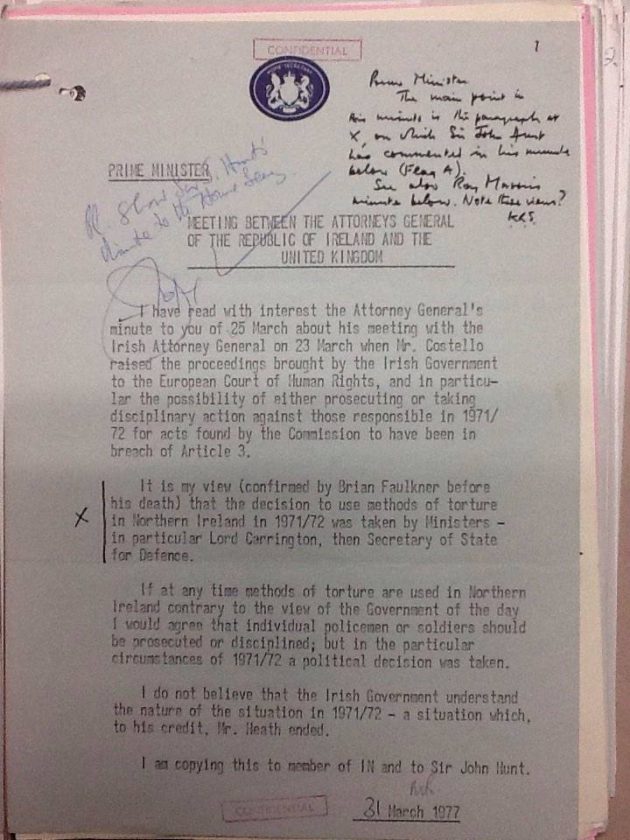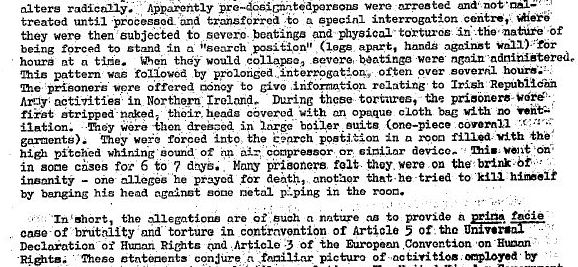Paper trail: from Northern Ireland’s hooded men to CIA’s global torture
In August 1971 the UK authorities arrested and interned hundreds of men in Northern Ireland. Fourteen of them were selected for "special treatment" - torture in a specially-built interrogation centre at a British Army camp. The men were subjected to the soon-to-be infamous "five techniques" of hooding, stress positions, white noise, sleep deprivation and deprivation of food and water - combined with brutal beatings & death threats.
Allegations soon emerged of abuse. Amnesty International sent its first ever research mission to the UK to investigate, interviewing the men and finding some of them to still be black and blue with bruises.
In it's October 30 1971 report, Amnesty found a "prima facie case of brutality and torture".
Responding to public outrage in Ireland, the Irish government made history by taking the first ever inter-state case under the European Convention of Human Rights, alleging the UK had tortured the men.
While the UK denied torture, Prime Minister Ted Heath soon announced a prohibition by UK forces of any future use of the techniques.
In 1976, the European Commission on Human Rights found that the UK had tortured the men, but the UK appealed the decision claiming that the techniques used had no long-term impact.
The appeal succeeded and in 1978 the European Court of Human Rights found that the interrogation amounted to "inhuman and degrading treatment" but not torture.
The difference was subsequently seized upon by those who wanted to use similar interrogation techniques.
In 2002, Jay Bybee in the US Attorney General's office prepared legal advice on what could and could not be done to interrogation subjects. He quoted liberally from the Ireland v UK 1978 decision in the infamous 'torture memos':
Within months, the CIA was using the "five techniques" in Iraq, Afghanistan and around the world.
Here's an excerpt from a CIA report on what they did when interrogating a "high value detainee" (HVD). The similarity of the torture techniques to those applied in Northern Ireland is striking.
With the publication today of the US Senate report into CIA torture, more of the horror of US abuses has now been laid bare.
Meanwhile, happy with the downgraded European Court decision and the "special stigma of torture" removed, the UK quietly forgot about Ted Heath's supposed probihition. In Iraq, the techniques were put to use again.
They cost Baha Mousa his life. The inquiry into his death found that the Iraqi's 2003 demise was caused by "factors including lack of food and water, heat, exhaustion, fear, previous injuries and the hooding and stress positions used by British troops - and a final struggle with his guards".
-

- Letter from Home Secretary Merlyn Rees to Prime Minister Jim Callaghan in 1977, when the UK was arguing (successfully, as it turned out) in Strasbourg that the techniques used were not torture
Meanwhile, through work by the Pat Finucane Centre, NUI Galway and RTÉ, files were discovered in the UK state archives in Kew suggesting that Britain misled the Court in 1978, withholding key evidence demonstrating they knew the techniques had long-term health impacts on the victims, and that the torture had been authorised at UK Cabinet level.
Following calls from Amnesty International and others, the Irish government has now decided to appeal the European Court decision in light of the new evidence. Perhaps the 'hooded men' will finally have their day in a Strasbourg Court with the full truth before it.
Shockingly, to date, no proper, independent investigation of the torture of the 'hooded men' has ever been carried out by the UK authorities and no-one has ever been held to account.
With total impunity in the UK for torture conducted in Northern Ireland in the 1970s, it is perhaps no wonder that the US followed the example of their closest ally when it came to fighting their 21st century "war on terror".
Our blogs are written by Amnesty International staff, volunteers and other interested individuals, to encourage debate around human rights issues. They do not necessarily represent the views of Amnesty International.

0 comments